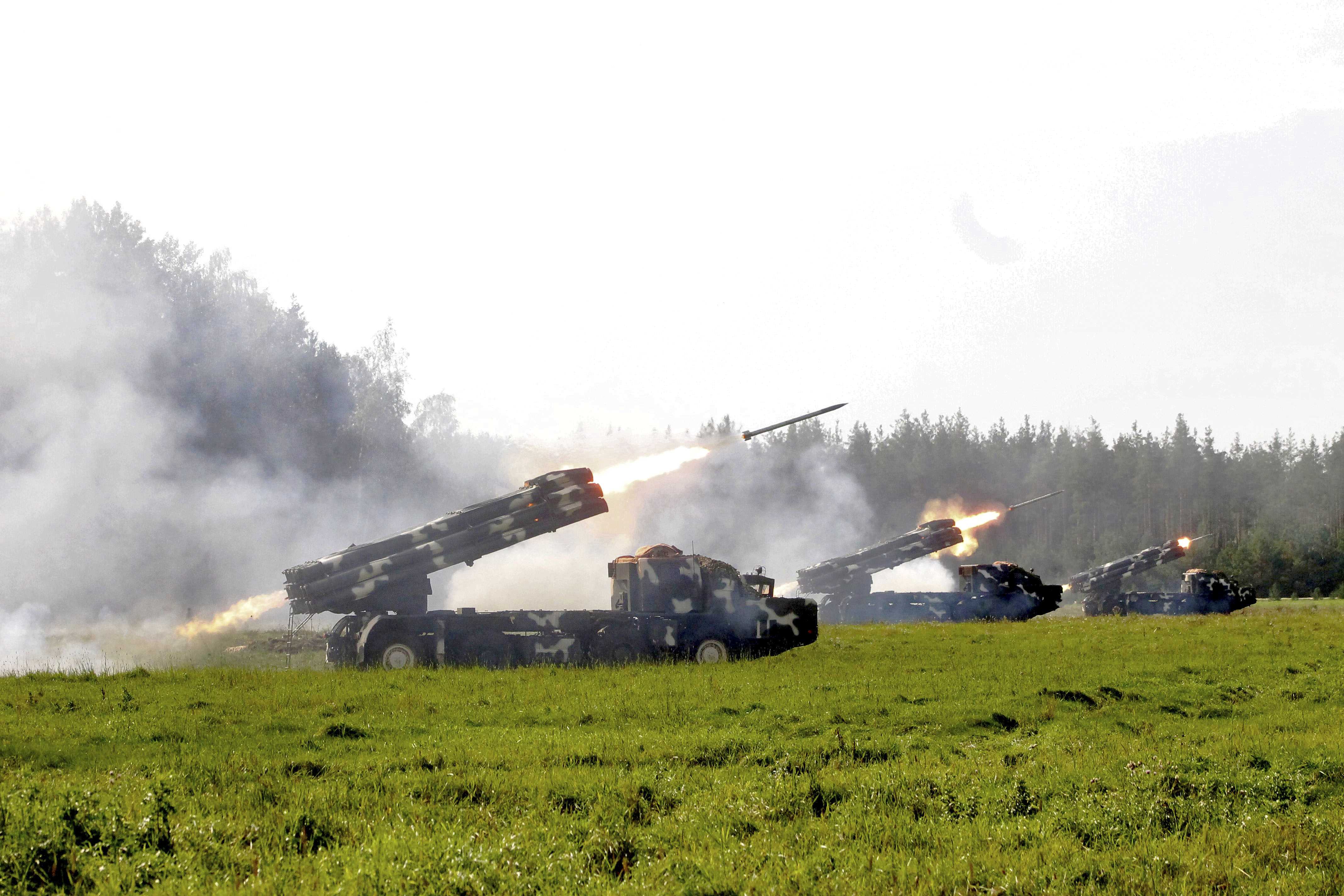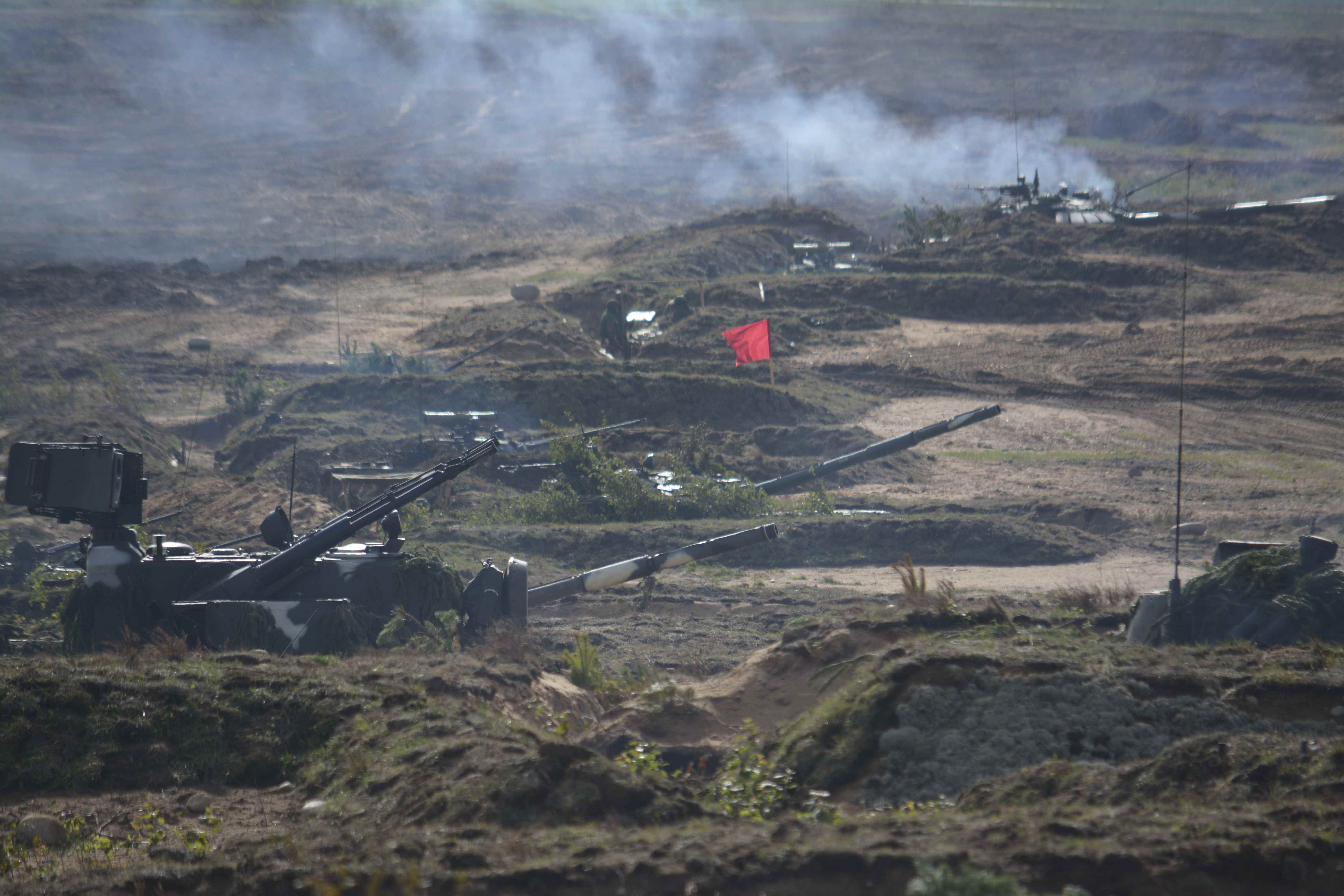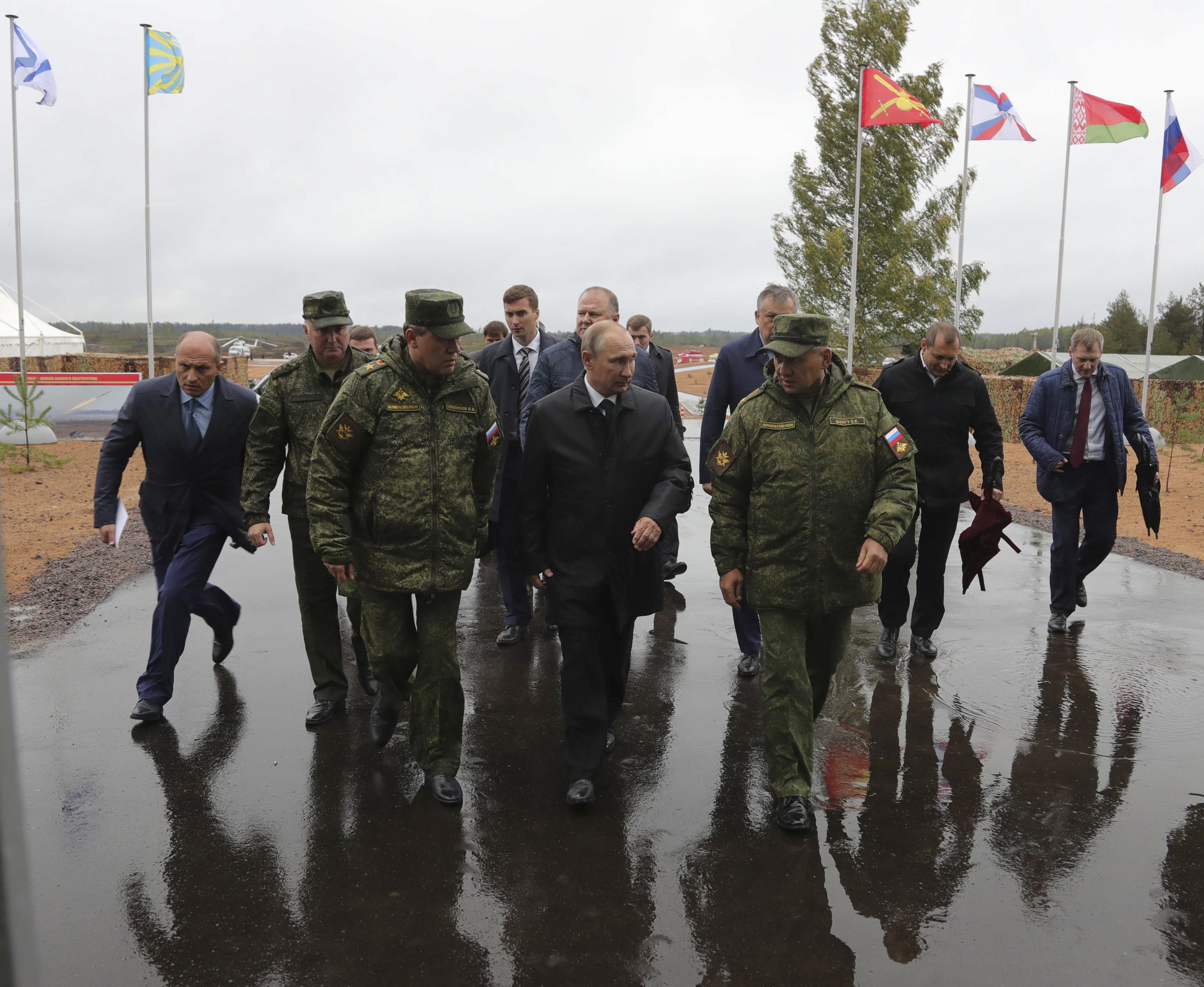What would a Russia-NATO war look like? Russia’s wargaming it right now.

LUGA, Russia – A revitalized Russian military on Monday sent tanks, paratroopers, artillery, antiaircraft weapons, jets and helicopters into frigid rains to engage the forces of a mock enemy called the “Western Coalition.” The barrage of firepower, part of war games that began last week, was an explosive show of force that Baltic leaders said was a simulation of an attack against NATO forces in Eastern Europe.
Russian President Vladimir Putin visited the field Monday, skipping the 72nd United Nations General Assembly in favor of the military exercises held jointly with Belarus. The muscle-flexing, which began Thursday, highlights the lethality of a fighting force that has taken a crash course of reforms and upgrades over the last decade.
In response, U.S. fighter jets in Lithuania have been scrambling nearly daily to inspect Russian activity over the Baltic Sea.
“It gets your blood pumping,” U.S. Air Force Lt. Col. Clinton Guenther, commander of a beefed-up NATO deployment of fighters in the Baltic country, said of the scrambling.
The Zapad war games – the word means “West” in Russian – focus on a hostile imaginary country called Veishnoria, which resembles a slice of the western part of Belarus with the biggest Catholic population and the highest prevalence of the Belarusan language. Veishnoria, along with two imaginary allies that appear to be stand-ins for the Baltics, attempts regime change in the Belarusan capital, Minsk, then foments separatism in parts of Belarus.
The Baltic countries that would be on the front lines of any potential Western conflict with Russia say that the exercises are only nominally about separatism and are mainly intended to leave them rattled.
“Russia is still trying to demonstrate force and aggression in its relations to its neighbors,” Lithuanian President Dalia Grybauskaite said in an interview.

But deployments this year of about 4,000 NATO troops across the Baltics and Poland leave the region far more confident that Russia will hold back from direct military confrontation, she said.
“We are prepared as never before. It’s incomparable with 2009 or 2013,” the years of the other most recent Western-facing exercises, she said. NATO deployed troops and further bolstered its military presence in the region after Moscow annexed Crimea from Ukraine in 2014.
Moscow has insisted that the exercises would rehearse a strictly defensive scenario and involve no more than 12,700 troops, just below the level that would require Russia to allow NATO observers under an international agreement. NATO leaders have said that the exercise may actually involve up to 100,000 troops.
For Russia, the exercises are a chance to exhibit the new strength of its military, which has undergone a decade-long modernization and deeply desires to shed its reputation as the creaky, inefficient successor of the Soviet Red Army. Military officials sought to show the success of the exercises despite the adverse weather conditions.
Putin arrived by helicopter at the Luzhsky military training range on Monday afternoon to observe the exercises. He did not give public statements, but let Russia’s guns speak for him. If the yearly parade of Russian missiles and tanks on Victory Day in Red Square is a moment for pomp and circumstance, the Zapad war games are supposed to display the efficiency and strength of the renewed, and battle-tested, Russian military.

On Monday, the exercises began with the Russians launching a desperate defense: Tracer bullets sailed over a muddy field, while antiaircraft guns released salvos to down enemy drones and cruise missiles. Russia launched short range ballistic missiles, naval forces, and its newest Ka-52 attack helicopters. After repelling the invasion, the Russian forces launched a T-72 tank-led counteroffensive. (In the end, the Russians won.)
Military commanders said that 95 foreign representatives from 50 countries, including NATO member states, attended the exercises. They also sought to underline Russian aviation’s ability to maintain combat operations in poor weather, with two flights of four Sukhoi Su-24M bombers carrying out airstrikes in the driving rain.
“The strike on ground targets was complicated by weather conditions: heavy precipitation, low clouds, and strong gusts of wind,” a Russian Defense Ministry report said. The planes dropped 250-kilogram high-explosive fragmentation bombs. The pilots destroyed ground targets imitating infrastructure, fortifications and convoys of the simulated enemy, it said.
In the first phase of the exercise, which ended over the weekend, Russian and Belarusan forces defended civilian infrastructure from enemy cruise missiles in coordination with ground-based air defense. With the diversionary force defeated, Russia went on the offensive for phase two.
The top U.S. general in Europe said NATO was being vigilant about the war games but that he had not “seen anything that indicates it being anything other than an exercise.”
In Tirana, Albania, Army Gen. Curtis Scaparrotti, who is also the Supreme Allied Commander of the North Atlantic Treaty Organization, said he had seen no evidence that Russia might leave a force in the Baltic region after the exercises conclude.
Scaparrotti did say said the exercises were “larger than what they told us.”
“It’s following in line with what we’ve seen with these annual exercises in the past. They’re usually very large. They’re usually initially defensive in nature but also have an offensive portion thereafter that looks to me like a rehearsal of an attack,” Scaparrotti added. “That’s worrisome if you’re a NATO country on the border.”
One Lithuanian army officer, Lt. Col. Linas Idzelis, said that some of his civilian friends considered planning vacations around the exercises, so that they would be outside the country in case of invasion. He said he told them they should not be concerned.
Putin’s arrival at the war games came as world leaders and diplomats gathered in New York for the U.N. General Assembly.
In recent months, the U.N. Security Council has hosted angry confrontations between Russia and the United States over alleged hacking in the 2016 U.S. presidential election, as well as the international response to the North Korean nuclear program.
Kremlin spokesman Dmitry Peskov told reporters Monday that Putin’s absence was not a U.N. snub.
“Indeed this year the president’s schedule did not allow him to participate in the General Assembly session, and he does not take part every year. So there’s nothing unusual in this case,” Peskov said.
Birnbaum reported from Vilnius, Lithuania and Roth reported from Moscow. Thomas Gibbons-Neff in Tirana, Albania, contributed to this report.